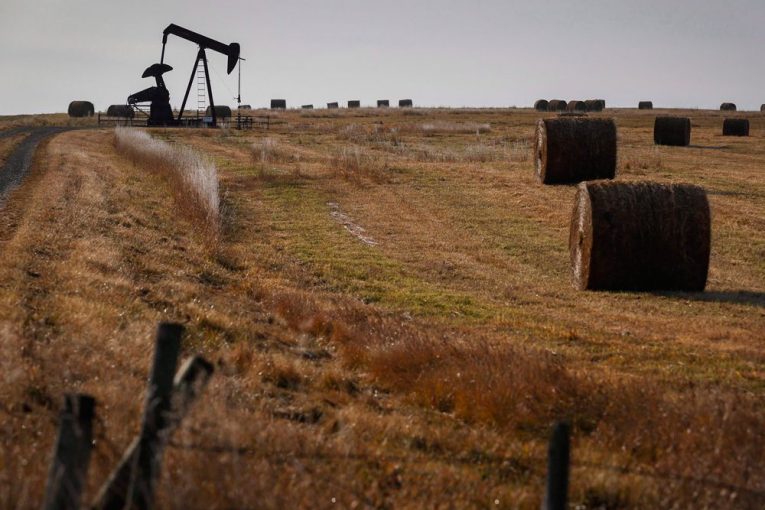
Welcome back to a world of US$70 oil.
It’s been more than two years since benchmark U.S. oil prices were at such a lofty level and they briefly returned to that mark on Monday, bolstering expectations of a revival for the Canadian oil sector in the second half of this year and into 2022.
Higher energy prices are also expected to help jump-start an economic recovery in Alberta, as a new Conference Board of Canada report projects the province will lead the country in growth this year and next.
For Canada’s petroleum producers, the sudden dash to $70-a-barrel oil is fuelling hopes of sustained strength over the next 18 months, although the price discount for Western Canadian Select (WCS) heavy crude has widened in recent weeks.
While WCS oil was trading around $55 a barrel on Monday, prices for benchmark West Texas Intermediate crude closed at $69.23 a barrel — after hitting $70 earlier in the day — and have jumped by more than 40 per cent since the beginning of the year.
“We are enormously excited about it and it’s probably ahead of our expectations by certainly two to three years. We thought we would get to $60, not $70,” Baytex Energy CEO Ed LaFehr said Monday.
“I am very bullish … All around, this is the strongest I’ve felt in five years in Baytex.”
A little over a year ago, there wasn’t much optimism in the oilpatch.
The Canadian sector was marooned in a crippling slump. Global energy demand plunged because of the pandemic, oil prices sank last spring and producers slashed spending and cut jobs.
The past 12 months have seen a sharp U-turn, with energy consumption recovering as COVID-19 vaccination levels have accelerated and economies have opened back up.
At a meeting last week, OPEC+ countries remained cautious and only increased output by 840,000 barrels per day (bpd) in July, instead of opting for higher production levels.
South of the border, U.S. oil production growth remains muted.
“This is a reasonable place for us to be,” said Ian Nieboer, managing director of energy consultancy Enverus in Calgary.
“It’s very buoyant, it’s great and there are a lot of smiles in the oilpatch right now.”
Enverus expects oil demand to continue growing and hit 98.8 million bpd in the final three months of the year, close to pre-pandemic levels and up from 93 million bpd in the first quarter.
With the global economy recovering and OPEC+ acting prudently, WTI crude will likely stay in the high $60s or low $70s through the second half of 2021, Nieboer said.
And they could go higher.
In a research note Monday, analyst Phil Skolnick of Eight Capital noted global vaccination data indicates there’s “a meaningful tailwind still to come in oil demand” from India and other key countries.
All but two U.S. states are seeing public health restrictions being eased while COVID-19 case counts are dropping, setting the table for increased consumption of gasoline, jet fuel and diesel.
“With the summer travel season in front of us, we expect to see a surge in demand, which would benefit product and oil prices,” he wrote.
How will companies respond to this uplift?
According to a research report, BMO said that its annual energy conference last week heard two familiar themes coming from oil and gas companies: ongoing plans to pay down debt and return capital to investors.
Canadian producers will pump out $22 billion of surplus cash flow this year, even after paying for capital expenditures and dividends, compared to just $100 million in 2020, BMO estimates.
At Baytex, the company announced in April plans to increase its capital spending by about 20 per cent from projections made last December when oil was trading in the $45-a-barrel range.
LaFehr noted the differential between benchmark U.S. prices and WCS heavy oil has widened this spring — it sat near $10 a barrel at the end of April and is now over $14 — but remains within the company’s five-year forecast.
However, with oilsands production rising, the differential is widening and it is “very important to watch,” said Adam Waterous, CEO of investment firm Waterous Energy Fund, which owns two privately held oil companies that produce about 80,000 bpd.
As for benchmark oil prices, Waterous noted a huge amount of spare production is still being held back by OPEC countries. While he has a constructive view on oil markets over the next three to five years, Waterous thinks the short-term rally has been driven by a “lot of euphoria.”
“Things tend to overshoot,” he said. “We are still spending capital, but we haven’t changed our capital spending plan just based on this. It’s too soon.”
Meanwhile, a new forecast by the Conference Board of Canada projects Alberta’s economy will grow by 7.2 per cent this year, up from earlier projections, powered by a rebound in oil and natural gas prices, stronger exports and the continued reopening of the economy.
After suffering the steepest decline of all Canadian provinces in 2020, it’s expected Alberta will see 5.6 per cent growth in GDP next year, while oil prices average $70 a barrel.
“The situation has really improved a lot more quickly than we thought, in terms of global oil supply and demand,” said board chief economist Pedro Antunes.
“It’s a good omen for the province, at least for recovery.”
Antunes points out investment levels in Alberta are coming off “rock-bottom levels” last year.
Yet, with oil hovering around $70 a barrel, the industry is highly profitable — and Alberta is primed and ready for the economy to bounce back in the latter half of the year and into 2022.
Chris Varcoe is a Calgary Herald columnist.
You can read more of the news on source
